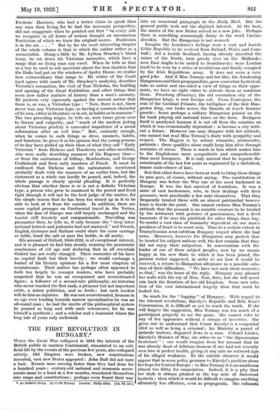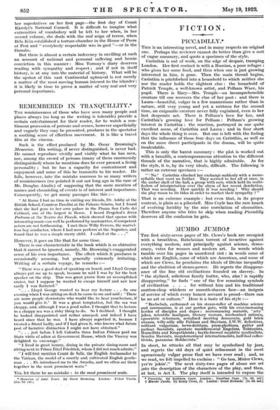THE FIRST REVOLUTION IN HUNGARY.*
WHEN the Great War collapsed in 1918 the interest of the British public in matters Continental, stimulated to an arti- ficial life by the events of the previous few years, also collapsed .utterly. Old Empires were broken, new constitutions invented, vast new States appeared : John Bull did not turn a hair. Events were moving faster than they had done for a hundred years : century-old national and economic move- ments came to a head in a few months, translated themselves into maps and constitutions ; perhaps even found their way • An Outlaw's Diar v. By C6clie Tormay London Philip Allan. [1.25. bd. net.]
into an occasional paragraph in the Daily Mail. But the general public took not the slightest interest. At the -best, the names of the new States served as a new joke. Perhaps there is something screamingly funny in the word Czecho- slovakia. But the Hungarian is not amused.
Imagine the Londoner's feelings were a vast and hostile Celtic Republic to be evolved from Ireland, Wales and Corn- wall ; did a hostile Scotland, having already absorbed the mines of the North, turn greedy eyes on the Midlands : were East Anglia to be united to Scandinavia : were London itself to be torn by a series of revolutions and finally occupied by the Irish Republican army. It does not seem a very good joke. And if Miss Tormay and her like, the Awakening Hungarians and their propagandists, grow somewhat hysterical, take as unfair and one-sided a view of things as their oppo- nents, we have no right either to ridicule them or condemn them. Pressburg (Posz6ny), the old coronation city of the Hungarian kings, is now foreign soil. From Esztergom, the seat of the Cardinal Primate, the birthplace of the first Hun- garian king, one looks across the Danube at Czech frontier guards : hears perhaps a solitary Hungarian patriot on the far bank playing old national tunes on the horn. Budapest itself is paralysed because it is cut off from the counties on which it was economically dependent : is become a city with- out a future. However one may disagree with her attitude, one cannot but read Miss Tormay's diary with sympathy and respect. The Magyar is by nature romantic, aristocratic, patriotic : those qualities alone could keep him alive through centuries of stress. There is much in him which makes him to the Englishman more sympathetic and comprehensible than most foreigners. It is only natural that he regards the catastrophe of the last few years as engineered by a diabolical, insane malevolence of fate.
But that other forces have been at work to bring these things to pass goes, of course, without saying. The constitution of Hungary was before the War one of the most backward in Europe. It was the last survival of feudalism. It was a state of vast landowners, who, in their dealings with their peasants, were practically a law unto themselves. That they frequently treated them with an almost patriarchal benevo- lence is beside the point. One cannot endorse Miss Tormay's attitude that the peasant is an amiable creature to be treated by the aristocrat with gestures of graciousness, but a devil incarnate if he uses his pitchfork for other things than hay. To render a vast class of humanity dependent on one man's goodness of heart is to court ruin. Thus to a certain extent in Transylvanian sans-culottism Hungary reaped where she had sown. Moreover, however the Hungarian may protest that he treated his subject nations well, the fact remains that they did not enjoy their subjection. In conversation with the leader of one of these subject peoples, now by no means happy in the new State to which it has been joined, the present writer suggested, in order to see how it would be received, a return to Hungarian allegiance as a possible solu- tion of their difficulties. " We have not such short memories as that," was the tenor of the reply. Hungary may placard her walls with the cry of Nem, Nem, Soha, but she will never win back the frontiers of her old kingdom. Some new solu- tion of the vast international tragedy than that must be looked for.
So much for the " lopping " of Hungary. With regard to the internal revolutions, Kkrolyi's Republic and Bela Kfm's Communism, it is difficult as yet to reach the truth. If she will forgive the suggestion, Miss Tormay was too much of a participant properly to see the game. She cannot refer to any of her opponents without a stream of invective. She gives one to understand that Count Kitrolyi is a congenital idiot as well as being a criminal : his Ministry a parcel of imbecile traitors, disguised Jews to a man. Colonel Linder, K6,rolyi's Minister of War, she refers to as " the dipsomaniac lieutenant " : one would imagine from her account that he was already dead of delirium tremens if one had not recently seen him in perfect health, giving at any rate no outward sign of his alleged weakness, To the outside observer it would appear that in some policy germane to latrolyi's pacifism alone lies hope for Central Europe : to Miss Tormay it is an anathema almost too filthy for enunciation. Indeed, it is a pity that her style is always pitched at the top note of rhetorical hysteria : than which it would be difficult to imagine anything ultimately less effective, even as propaganda. She exhausts her superlatives on her first page—the first day of Count Ke.rolyi's National Council. It is difficult to imagine what extremities of vocabulary will be left to her when, in her second volume, she deals with the real reign of terror, when Bela Kin established a torture-chamber in the House of Peers at Pest and " everybody respectable was in gaol "—or in the Danube.
But there is almost a certain indecency in cavilling at such an account of national and personal suffering and heroic conviction in this manner : Miss Tormay's diary deserves reading with sympathy and respect ; and if not in itself history, is at any rate the material of history. What will be the upshot of this vast Continental upheaval is not merely a matter of the most moving human interest to the islander : it is likely in time to prove a matter of very real and very personal importance.











































 Previous page
Previous page